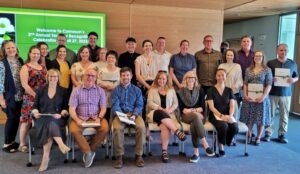On Thursday, April 27, 29 instructors from Camosun College received awards celebrating their contributions to teaching and learning at the college.
The second annual teacher recognition award celebration was held in the Sherri Bell Hall in the Wilna Thomas Building at Lansdowne. The instructors who were awarded were nominated by students, faculty, and staff members who wrote testimonials commemorating the instructors’ hard work.
The 28 recipients of the teaching recognition awards this year were Andrea Durdle, Arloene Burak, Brent McMillen, Brooke Cameron, Dan Reeve, Darren Hall, David Armstrong, David Raju, Dianne Patterson, Emah Christiansen, Gilles Cazelais, James Smyth, Joanne Irvine, Joyce van de Vegte, Katie Waterhouse, Kendal Adam, Lynnea Jackson, Matt Agbay, Meaghan Feduck, Michelle Lysak, Nicole Kilburn, Noreen Ortilla, Pei Mei Chia, Phil Vreugdenhil, Richard Burman, Robin Fast, Selena Hebig, and Tony Vernon.

As well, The Mary Burgess Open Education Recognition Award was given to Biology instructor Charlie Molnar.
The award celebrates Molnar’s achievements in open learning—in 2015, he helped create a free open-source textbook, Concepts of Biology—1st Canadian Edition, which is continuously updated in order to give students access to current materials.
Molnar believes that while this textbook has many helpful features, the best one is that it’s free to students.
“The modern textbook companies write many different formats that students can take advantage of and provide various resources, like videos and online quizzes and stuff like that,” says Molnar. “The point is is that students get this quality product with all the different aspects included and it is forever, and it is free of charge. So, they can have this and don’t have to rent it or return it or anything of the sort.”
The Mary Burgess Award is new this year, and Molnar is happy to see it become an annual award. He believes that free materials like Concepts of Biology have a level of interaction that students don’t get from a regular textbook and hopes that more open-source textbooks will continue to be created. Molnar also acknowledges how it feels to be commended for his hard work as an instructor.
“Everybody has been really remarkably graceful and kind, and extremely helpful. And it’s lovely to see that it’s now part of the teacher award repertoire,” he says. “This was a lovely way to be recognized for something that will persist after I’m retired.”
Anthropology instructor Nicole Kilburn was one of the teachers who received an award this year. She holds a similar view to Molnar, saying that awards like these can help boost the morale of teachers.
“We put a lot of work into what we do. I think that sometimes that’s unseen,” says Kilburn. “I know when I was a student, I didn’t really think too much about where lecture content came from, or, you know, how people come up with different assignments or assignment topics or whatever. And, you know, here I am on the other side of the equation, and I know that there’s a huge amount of work that goes into that. And to have that seen, I really feel appreciated.”
Kilburn says that she loves what she does for work, and she realizes that not everyone can say that. The award was a good check-in for her and proved that her teaching methods are positively impacting her students. She does a lot of hands-on learning and is now seeing the benefits in her students.
“I put a lot of time and heart into what I do, and it feels really good to have that seen and appreciated by my peers, and my students in particular,” she says. “Because it would be really unfortunate if those efforts weren’t worth it, you know, if I put a huge amount of work in, but it was kind of ineffective. But to have students tell me that it resonates, that they appreciate getting to learn in hands-on ways and that things are relevant and current, and interesting. It means that putting in all of the extra time, that’s the reason why I do it.”
Correction: We originally identified Nicole Kilburn as Nicole Kilman in this story. We apologize for the mistake.
